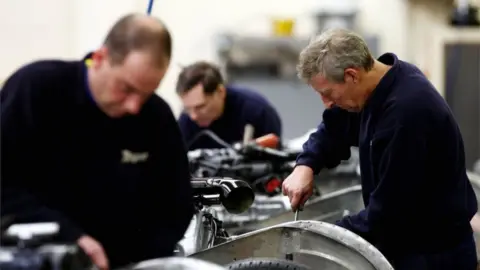Manufacturing shrinks as Brexit stockpiling halts
 PA
PAThe UK manufacturing sector contracted in May for the first time since July 2016 as stockpiling eased ahead of Brexit, an influential survey shows.
The research, by IHS Markit/CIPS, said firms found difficulty convincing clients to commit to new contracts.
The manufacturing Purchasing Managers' Index (PMI) was 49.4, down from 53.1 in April when it was lifted by stockpiling ahead of the UK's expected EU exit.
Any reading below 50 indicates contraction.
The last time there was a reading below 50 was the month after the EU referendum.
The UK had been due to leave the EU on 30 March and the survey had previously shown stockpiling ahead of this departure date.
In April, the UK and EU subsequently agreed a delay to Brexit until 31 October.
May's survey found that stockpiling meant that it was difficult for manufacturers to win new orders.
The volume of new business fell for the first time in seven months and at one of the fastest rates recorded by the survey in the past six-and-a-half years.
Rob Dobson, director at IHS Markit, which compiles the survey, said new order inflows declined from both domestic and overseas markets.
"Demand was also impacted by ongoing global trade tensions, as well as by companies starting to unwind inventories built up in advance of the original Brexit date. Some EU-based clients were also reported to have shifted supply chains away from the UK," he said.
'Brexit hangover'
Manufacturing jobs fell for the second consecutive month and Mr Dobson said the sector's downturn "may have further to run and will have negative ramifications for growth in the months ahead."
Duncan Brock, group director at the Chartered Institute of Procurement and Supply (CIPS) which also conducts the survey, said: "A slowdown in the global economy, and trade wars hotting up could tip the scales even further next month and increase the likelihood that the UK manufacturing sector will remain in contraction territory".
The reading of 49.4 on the index was was well below the figure expected by economists polled by Reuters who had forecast a reading of 52, which would have meant the sector was still expanding.
Thomas Pugh, UK economist at Capital Economics, said manufacturing was likely to remain subdued and that the "hangover from Brexit preparations in the sector will weigh on GDP" in the second quarter.
Samuel Tombs, chief UK economist at Pantheon Macroeconomics, said he had factored in a reversal in manufacturing into his estimate for GDP in the second quarter.
He expects growth to slow to 0.2% from 0.5% in the first three months of the year.
